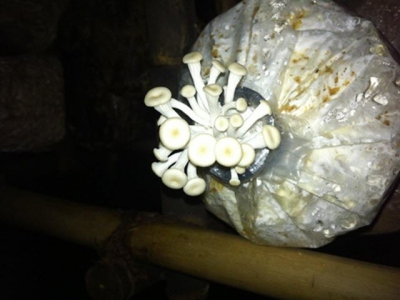Vietnams mushroom cultivation declines due to poor technology use

Vietnam has rich by-product sources that could be used to grow mushrooms. However, the country is losing its competitive edge as the domestic market is flooded with mushroom imports.
The total mushroom output in Vietnam is 270,000 tons with 16 mushroom varieties, mostly sourced from the north and south, a report found. In the domestic market, mushroom products are mostly fresh or dried, while exports are mostly canned products.
Vietnam in the past cultivated mushrooms throughout the country but the amount has declined sharply.
Le Quang Thai from Nacentech Technology and Business Incubator Center (NTBIC) said the diversity of edible and medicinal mushrooms in Vietnam is still poor.
Research institutions do not focus on the research and development of mushroom varieties, resulting in low stability of varieties and low productivity. Most straw (Volvariella volvacea) and oyster mushrooms are imports.
Vietnam has rich by-product sources that could be used to grow mushrooms. However, the country is losing its competitive edge as the domestic market is flooded with mushroom imports.
Meanwhile, cultivation facilities lack knowledge in material preparation, technical care and workshop sanitation. The use of technology, such as environmental sensors and automation, has not been seriously considered.
The mushroom production process can be divided into five phases: composting, spawning, casing, pinning and harvesting.
According to Thai, the biggest problem lies in post-harvesting preservation technology. Mushrooms are mainly consumed as fresh products or dried and salted for export within 24 hours after harvesting.
Technology to help
In some localities and enterprises, technology has been used to develop mushroom farming, such as Bac Giang, Nghe An, HCMC, Kinoko and Fuha Farm.
However, the number is modest compared with the great potential of Vietnam’s mushroom production industry. In general, mushrooms are still cultivated manually in the traditional way as farmers do not know that they can improve productivity with technology.
The technology of producing mushroom varieties by the Center for Plant Biotechnology under the Institute of Agricultural Genetics is believed to have many advantages over other technologies.
Under favorable conditions, hyphae can be used after culturing for 3-5 days in liquid environment. This technology is suitable for the production of valuable mushrooms on an industrial scale.
Local scientists have mastered this technology in the laboratory, but further steps are needed to bring it into reality.
A scientist mentioned the application of somatic fusion, a type of genetic modification in plants by which two distinct species of plants are fused together to form a new hybrid plant.
Thai also suggested applying ultraviolet radiation technology in mushroom preservation to help increase the nutritional content. The technology, utilized in some countries such as Denmark, the US and Australia, is feasible for Vietnam.
In addition, some IoT technologies, wireless sensor networks and drip irrigation could be applied to improve mushroom production.
Related news
 Farmers in Binh Duong are good in production and business
Farmers in Binh Duong are good in production and business A delegation of provincial Farmers Association has just had a meeting with provincial leaders ahead of the 7th national Farmers Association congress
 Cà Mau looks to VietGAP standards
Cà Mau looks to VietGAP standards The southernmost province of Cà Mau has encouraged farmers to raise shrimp and grow more rice and other crops under VietGAP to increase profits.
 Fishery enterprises expand the domestic market
Fishery enterprises expand the domestic market In addition to the development of exports, many domestic fishery companies have also focused on developing the domestic market, but there are many difficulties.